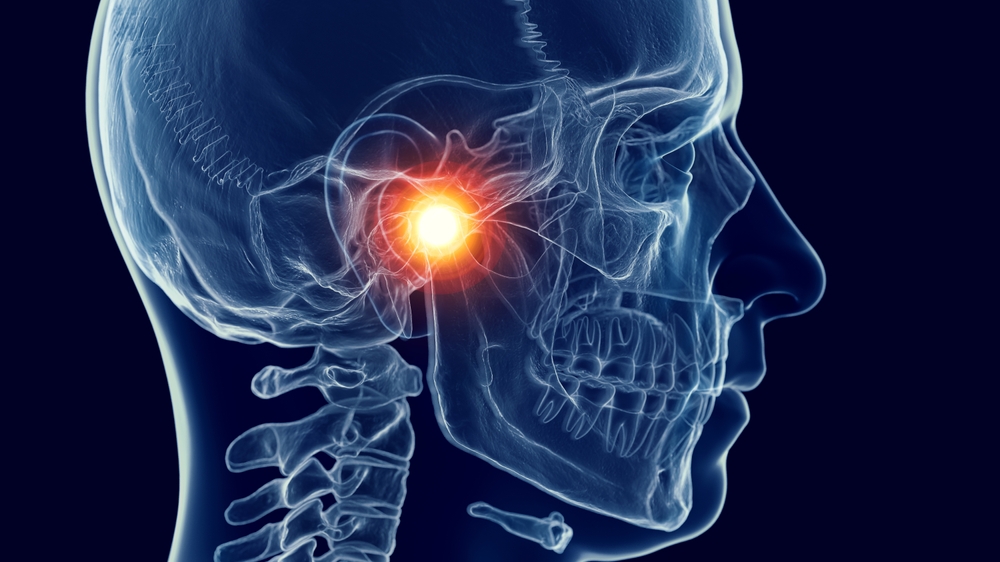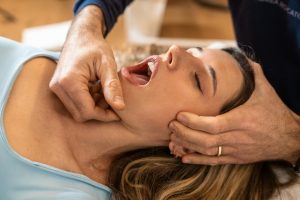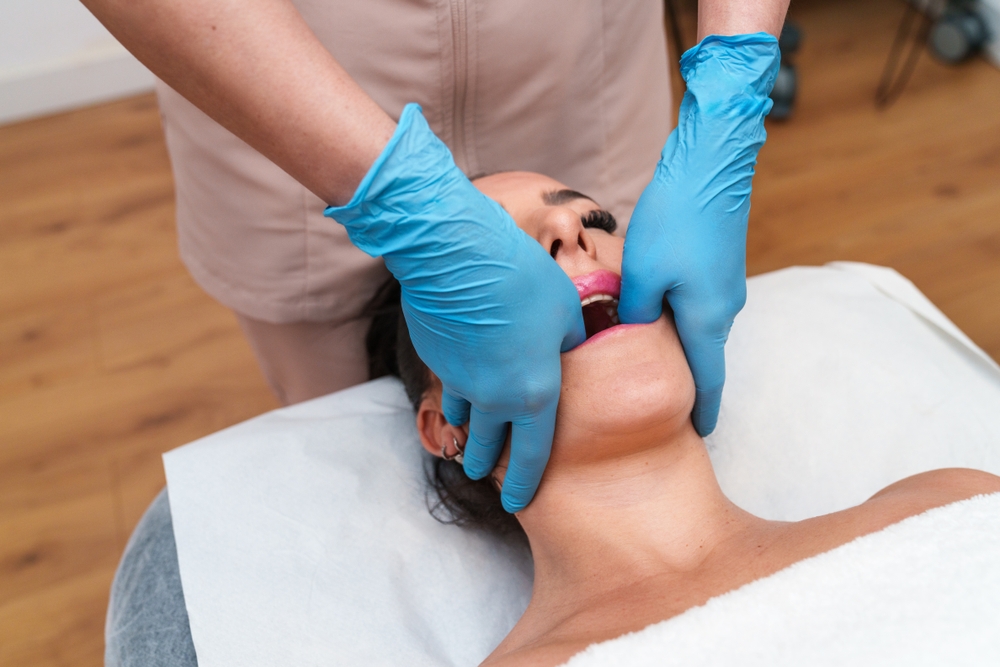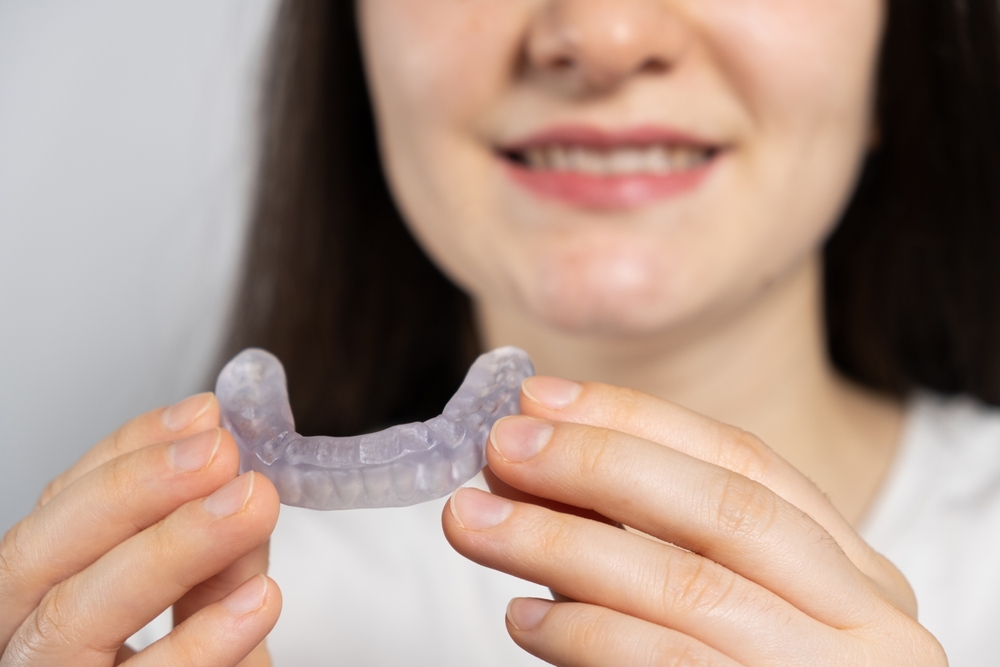TMJ-TMD
Understanding TMJ Disorder in Aventura, Pembroke Pines, and Fort Lauderdale, FL
Fight Back Against Jaw Pain with The Dental Care Group
Do you experience persistent jaw pain, headaches, or difficulty chewing? These could be signs of a temporomandibular joint (TMJ) disorder, a condition affecting the jaw joint and surrounding muscles. TMJ disorders can significantly impact your comfort and quality of life, but effective treatments are available.
At The Dental Care Group, we understand the impact of TMJ disorders. We offer high-quality, personalized care, utilizing the latest technology to provide comfortable, affordable, and convenient treatments. Our goal is to help you find lasting relief from TMJ pain and restore your ability to enjoy everyday activities.
If you’re experiencing jaw pain or other TMJ symptoms, don’t hesitate to seek help. Contact The Dental Care Group today to schedule a consultation at our Aventura office at 305-935-2797, Pembroke Pines office at 954-430-2300, or Fort Lauderdale office at 954-963-3706. Let our South Florida dental team help you reclaim your comfort and well-being.
Benefits of TMJ Treatment
Living with TMJ disorder can mean chronic jaw pain, headaches, and difficulty eating or speaking. Effective TMJ treatment alleviates these symptoms, restoring comfort and function to your daily life. By addressing the root cause—whether it’s muscle tension, bite misalignment, or joint inflammation—treatment helps reduce pain, prevent further damage, and improve jaw mobility.
The benefits of TMD treatment don’t stop there. Many patients also experience relief from secondary symptoms like earaches, dizziness, and neck pain, which are often linked to TMJ dysfunction. Additionally, early intervention can prevent long-term complications such as excessive tooth wear or joint deterioration. With the right approach, TMJ treatment enhances your overall well-being, allowing you to enjoy life without constant discomfort.

The Dental Care Group: What Our Patients Say About Us
At The Dental Care Group, we take pride in providing exceptional care and life-changing results. Nothing speaks louder than the experiences of our patients. From routine dental cleanings to advanced TMJ treatment, our team is dedicated to delivering compassionate, high-quality dentistry in Aventura, Pembroke Pines, and Fort Lauderdale. Read what our patients have to say about their journeys to healthier, more confident smiles!
- “This was my first visit. I was in tremendous pain. Dr. Glicksman staff was kind and helpful, especially to elderly me who couldn’t think straight to deal with the health care apps. Dr. Glicksman asked all the right questions. Explained things well and saw problems other dentists did not see or consider. His office has top of the line diagnostic machines. I look forward to having my multiple teeth problem’s solved on the next visits.” –Lisa Lehman
- “I have had the best experience working with Dr. Rick Mars, Dr. Michael Zinn and Dr. Matthew Fine. From routine cleaning, Invisalign, general dentistry and finally implant surgery the staff at both Fort Lauderdale and Aventura have been courteous, professional and caring every step of the way. I just finished my last phase of the implants with crowns working with Dr. Rick Mars.” –Samuel Turpin
Don’t just take their word for it. Our South Florida staff is eager to meet you, whether you’re looking for regular dental cleanings, TMJ treatment, or more extensive dental restorations The Dental Care Group is here for you every step of the way.
Understanding the Temporomandibular Joint (TMJ)

The temporomandibular joint (TMJ) connects your lower jawbone (mandible) to your skull, enabling essential movements like talking, chewing, and yawning. Located on each side of your face in front of your ears, these joints facilitate a sliding hinge motion. The proper alignment and synchronized movement of the TMJ, along with related muscles, are critical for comfortable jaw function. When these structures are misaligned or not synchronized, it can lead to a temporomandibular disorder (TMD).
Untreated TMD can lead to joint damage, sleep apnea, migraines, and even tooth loss. Recognizing and diagnosing TMJ disorders early can help prevent lasting damage.
Types of TMJ Disorders
TMDs are classified into three main categories, each affecting different aspects of the jaw and surrounding structures. A person may experience one or more of these conditions simultaneously.
Myofascial Pain Disorder
Myofascial pain disorder, the most common type of TMD, involves discomfort or pain in the muscles controlling jaw function and the fascia that covers them. This pain can extend to the neck and shoulders. Factors contributing to myofascial pain include jaw overuse, stress, and trauma.
Internal Derangement of the Joint
Internal derangement involves issues within the joint itself, such as a dislocated jaw or a displaced disc. The disc, a cartilage cushion between the jawbone and skull, can shift out of position or sustain damage. Injury to the condyle, the rounded end of the jaw bone, can also cause internal derangement.
Degenerative Joint Disease
Degenerative joint disease includes conditions like osteoarthritis or rheumatoid arthritis affecting the jaw joint. These conditions cause the cartilage in the joint to deteriorate, leading to pain and reduced movement.
Common Causes and Risk Factors of TMJ Disorders
Identifying the exact cause of a TMJ disorder can be difficult, as multiple factors often contribute to its development. These factors can include:
- Arthritis: Various types of arthritis, such as rheumatoid arthritis and osteoarthritis, can damage the cartilage in the TMJ.
- Bruxism: Chronic teeth grinding or clenching (bruxism) places excessive pressure on the TMJ.
- Connective Tissue Diseases: Certain connective tissue diseases can cause problems that may affect the TMJ.
- Genetics: Genetic factors may predispose some individuals to developing TMJ disorders.
- Jaw Injury: Trauma to the jaw or temporomandibular joint can lead to TMDs.
- Psychological and Life Stressors: Stress and psychological factors can contribute to TMD development and its long-term effects.
Simple Steps to Prevent TMD:
- Relax your face — remember the rule: “Lips together, teeth apart”
- Avoid grinding your teeth
- Avoid constant gum chewing
- Don’t cradle the phone receiver between your head and shoulder — either use a headset or hold the receiver in your hand
- Chew food evenly on both sides of your mouth
- Do not sit with your chin rested on your hand
- Practice good posture — keep your head up, back straight, and shoulders squared
The Dental Care Group is committed to providing relief from TMJ pain and restoring your oral health. Schedule a consultation today at our Aventura office by calling 305-935-2797, Pembroke Pines office by calling 954-430-2300, or Fort Lauderdale office by calling 954-963-3706. Experience our personalized care and state-of-the-art technology.
Recognizing the Symptoms of TMJ Disorders
Symptoms of TMJ disorders can vary significantly among individuals. Common signs and symptoms include:
- Aching facial pain.
Aching pain in and around the ear.
- Clicking or popping sounds in the jaw joint when opening or closing the mouth.
- Difficulty chewing or pain while chewing.
- Jaw stiffness.
- Locking of the joint, making it difficult to open or close the mouth.
- Limited movement of the jaw.
- Pain or tenderness in the jaw.
- Pain that spreads to the face or neck.
- Ringing in the ears, hearing loss, or dizziness.
Tenderness of the jaw muscles.
- Headache.
- Neck pain.
- Earaches.
It’s vital to consult a healthcare provider for a diagnosis if you experience these symptoms. Keep in mind that sounds without pain in the TMJs are considered normal and don’t need treatment.
Achieving a Precise Diagnosis for TMJ Disorders

Diagnosing TMJ disorders involves a comprehensive approach. Your doctor or dentist will ask detailed questions about your pain, including its location, triggers, and what makes it better or worse. They will:
- Check your medical history.
- Examine your head, neck, face, and jaw for tenderness, clicking or popping, and movement difficulties.
- Evaluate the range of motion in your jaw.
- Feel and listen to your jaw when you open and close your mouth.
- Press on areas around your jaw to identify sites of pain or discomfort.
- Request imaging studies such as X-rays, MRI, or CT scans to get a closer look at the joint.
Effective Treatment Options for TMJ Disorders
Treatment for TMJ disorders aims to relieve pain, restore normal jaw function, and improve quality of life. The initial approach typically involves conservative, non-surgical methods. Surgery is generally considered a last resort when other treatments have failed.
Non-Surgical Treatments
- Medications: Pain relievers (over-the-counter and prescription), anti-inflammatories, muscle relaxants, and tricyclic antidepressants can help manage pain and muscle spasms.
- Physical Therapy: Physical therapy aims to restore movement and physical function through manual therapy, exercises, and techniques like heat or cold application.
- Intraoral Appliances: Devices like night guards or splints fit over the teeth to prevent teeth grinding and ease muscle tension.
- Self-Management and Behavioral Health Approaches: Relaxation techniques, meditation, cognitive behavioral therapy, and biofeedback can help manage stress and pain.
- Complementary Treatments: Acupuncture and transcutaneous electrical nerve stimulation (TENS) are alternative therapies that may provide some relief.



Surgical and Other Procedures
- Arthrocentesis: A minimally invasive procedure that uses needles to flush the joint, removing debris and inflammatory substances.
- Injections: Corticosteroid injections into the joint may reduce inflammation, while botulinum toxin type A (Botox) injections into the jaw muscles may relieve pain.
- TMJ Arthroscopy: A procedure where a doctor inserts an instrument with a tiny video camera into the jaw joint to see the joint, remove adhesions, or reposition the joint’s disc.
- Modified Condylotomy: A surgical procedure on the mandible that can help with pain and locking.
- Open-Joint Surgery: Open-joint surgery (arthrotomy) to repair or replace the joint. Open-joint surgery involves more risks than other procedures do and should be considered very carefully, after discussing the pros and cons.
- Dental Implants: Artificial devices that are used to replace part of the jaw joint or the entire joint.
Before undergoing any procedure, be sure to ask about TMD treatment costs, simpler treatments, and explore all the risks. Seek opinions from our qualified dental specialists in South Florida. Contact The Dental Care Group to schedule your appointment and discover lasting relief. Call our Aventura office at 305-935-2797, Pembroke Pines office at 954-430-2300, or Fort Lauderdale office at 954-963-3706.
Frequently Asked Questions
Is TMJ disorder a common condition?
Yes, TMJ disorder is relatively common, affecting millions globally. It is more prevalent in women, particularly between the ages of 20 and 40. While many people experience TMJ symptoms, not everyone seeks treatment or receives an accurate diagnosis, making it difficult to determine the exact prevalence.
Can TMJ disorders resolve on their own?
Many cases of TMJ disorders are temporary and improve without treatment. Simple self-care practices, such as eating soft foods, applying heat or cold, and avoiding excessive jaw movements, can often alleviate discomfort. However, if symptoms persist or worsen, professional guidance is essential to prevent long-term problems.
What lifestyle changes can help manage TMJ symptoms?
Several lifestyle adjustments can help minimize TMJ symptoms. Practicing good posture, managing stress through relaxation techniques, and avoiding habits like teeth grinding or gum chewing can reduce jaw tension. Eating soft foods, cutting food into smaller pieces, and avoiding extreme jaw movements can also decrease strain on the TMJ.
Are there specific exercises that can alleviate TMJ pain?
Specific jaw exercises can improve flexibility, strengthen muscles, and alleviate tension. These exercises often include gentle stretching and strengthening routines designed to increase your range of motion and promote relaxation of the jaw muscles. A physical therapist or healthcare provider can guide you on proper techniques to maximize benefits and avoid further strain.
When is surgery necessary for TMJ disorders?
Surgery is typically considered a last resort for TMJ disorders when conservative treatments prove ineffective. Surgical interventions may be necessary to address structural problems in the joint, such as severe damage, displacement, or bony growths. A thorough evaluation by a doctor can determine if surgery is the most suitable option for your condition.
The Dental Care Group: Your Path to TMJ Relief
The Dental Care Group is dedicated to providing comfortable, affordable, and convenient dental care. Voted Best Dental Office in Miami-Dade for 2024 by the Miami Herald, we combine compassion with advanced dental practices. Don’t let TMJ pain hold you back. Schedule your consultation today by calling our Aventura dental office at 305-935-2797, Pembroke Pines dentist at 954-430-2300, or Fort Lauderdale dentist at 954-963-3706. We look forward to helping you achieve lasting comfort and a healthier smile.
Locations Performed in
What they say
Carlos Corretjer
Elaine Adler
Dave Chase
Yesenia Ruiz
Maria Perez
Payment Information
CASH

CHECK

CREDIT CARD

Financing

The cost of your treatment will vary depending on your individual needs and treatment plan. We will discuss with you the cost of your treatment and each of your available payment options before you begin, so that you can make the best choice for you.
We offer:
- Easy Payment Options
- Affordable Savings Plans
- Web Specials
- Dental Care Group Discount program


 Aching pain in and around the ear.
Aching pain in and around the ear. Tenderness of the jaw muscles.
Tenderness of the jaw muscles.
















